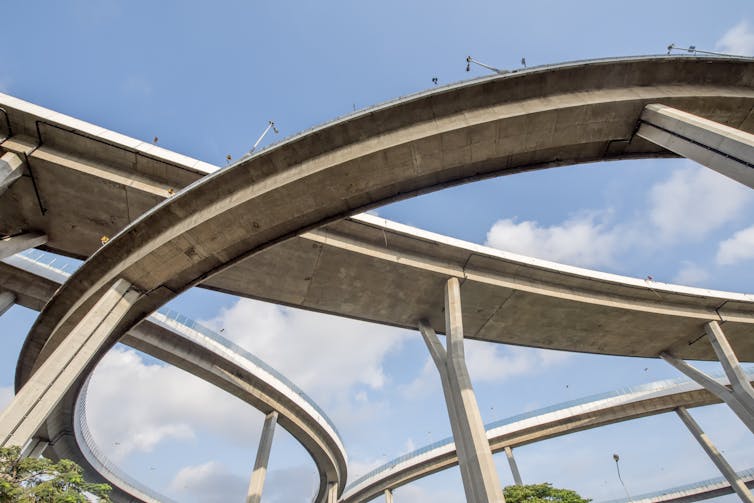The behind-the-scenes people and organizations connecting science and decision-making
- Written by Stephen Posner, Director of Policy, University of Vermont
The role of science in society has never been more important. Scientific perspectives are critical for understanding complex issues such as the COVID-19 pandemic, climate change, access to higher education and systemic racism.
The Biden administration promises to “listen to the science[1]” and “marshal the forces of science[2].”
But how does scientific information actually make its way from researcher to policymaker? We study[3] the individuals and organizations that serve as intermediaries[4] between these two worlds. After reviewing hundreds of cases, we found intermediaries not only help translate science but often facilitate two-way relationships between scientists and policymakers.
Getting knowledge to policymakers
Intermediaries are funded through many sources. They can be based at universities[5], nonprofit organizations[6] or in government[7]. Intermediaries have always existed. However, scientists, policymakers and funders are increasingly recognizing their value – and the need to professionalize their role[8].
Sometimes individuals or organizations naturally broker information between scientists and policymakers, even though it may not be a stated part of their job.
In Michigan, county-level intermediate school districts[9] are governmental entities that provide administrative and instructional resources to local school districts. These administrative bodies know a lot about the school districts they serve and often function as intermediaries between local districts and researchers. For example, one intermediate school district recently provided information about a research-based literacy program[10] to help a local school district make a curriculum decision.
Other times, intermediaries are hired as part of a project or within an organization. While a researcher can always play this role, it helps to have staff dedicated to connecting science to decision-makers. Building relationships that last takes time – and academia often doesn’t reward researchers for engaging with policy.
The Gund Institute for Environment at the University of Vermont has employed one of us[11] as an intermediary for the past two years. The behind-the-scenes work has included tasks such as arranging for scientists to testify to legislative committees and facilitating meetings between researchers and leaders of relevant federal programs.
The work of intermediaries can have real-world impacts on timely issues, from food insecurity related to COVID-19[12] to water quality initiatives[13] to charter school policies[14].
Two-way communication
Ideally, intermediaries help information to flow in both directions between scientists and policymakers.
For example, they may help scientists translate research about projected shifts in rainfall patterns to policymakers who need to manage a community’s limited water supply. At the same time, intermediaries may share with scientists information about the water infrastructure decisions facing policymakers. This exchange helps policymakers make informed decisions – and helps scientists produce research that addresses real-world questions and problems.
 Bridging the worlds of science and policy-making can be a full-time job.
Jung Getty/Moment via Getty Images[15]
Bridging the worlds of science and policy-making can be a full-time job.
Jung Getty/Moment via Getty Images[15]
But the flow of information is rarely linear or orderly. Intermediaries need to continuously create dynamic conversations in order to generate responsive, two-way communication.
Fortunately, scientists, policymakers and funders have exhibited increased interest in this work, by creating opportunities to improve science advice in government[16] or use research-practice partnerships[17] in education. Such efforts enable intermediaries to facilitate ongoing two-way communication, build common ground and maintain relationships.
[Understand new developments in science, health and technology, each week. Subscribe to The Conversation’s science newsletter[18].]
Trust is a key ingredient
One of the most important functions intermediaries play is to build and maintain relationships between people, in the process helping scientists become trusted sources of new ideas.
Trust is central[19] to whether decision-makers use research evidence. While scientific credibility is important, people’s relationship with the knowledge[20] also affects whether they decide to use it. Does a decision-maker trust the evidence? How do other pieces of information or misinformation compete with scientific evidence? And is the evidence easy to understand and compatible with the decision-makers’ values[21]?
The reality is, even when decision-makers trust and pay attention to science, it is only one factor among many that informs policy.
During the debates about reopening schools[22] during the COVID-19 pandemic, the evidence on viral spread in schools was incomplete[23]. People questioned health experts and elected officials. Intermediaries brokered information on both sides of the debate, yet many competing factors, conflicting values and political interests swayed decisions.
Science alone doesn’t always show the best path forward. Public leaders still need to make decisions based on value judgments[24] and what citizens care about. Even when people do agree about scientific facts, conflicting values[25] can lead to disagreement and inaction.
But science intermediaries can help introduce options, expand the range of choices being considered and ensure research evidence is a part of policy debates.
References
- ^ listen to the science (www.whitehouse.gov)
- ^ marshal the forces of science (apnews.com)
- ^ study (scholar.google.com)
- ^ individuals and organizations that serve as intermediaries (doi.org)
- ^ universities (doi.org)
- ^ nonprofit organizations (doi.org)
- ^ government (data.globalchange.gov)
- ^ professionalize their role (doi.org)
- ^ intermediate school districts (www.mackinac.org)
- ^ recently provided information about a research-based literacy program (doi.org)
- ^ one of us (scholar.google.com)
- ^ food insecurity related to COVID-19 (www.uvm.edu)
- ^ water quality initiatives (www.uvm.edu)
- ^ charter school policies (doi.org)
- ^ Jung Getty/Moment via Getty Images (www.gettyimages.com)
- ^ improve science advice in government (www.dayoneproject.org)
- ^ research-practice partnerships (rpp.wtgrantfoundation.org)
- ^ Subscribe to The Conversation’s science newsletter (theconversation.com)
- ^ Trust is central (doi.org)
- ^ relationship with the knowledge (doi.org)
- ^ easy to understand and compatible with the decision-makers’ values (researchschool.org.uk)
- ^ debates about reopening schools (www.npr.org)
- ^ evidence on viral spread in schools was incomplete (doi.org)
- ^ value judgments (slate.com)
- ^ conflicting values (doi.org)
















